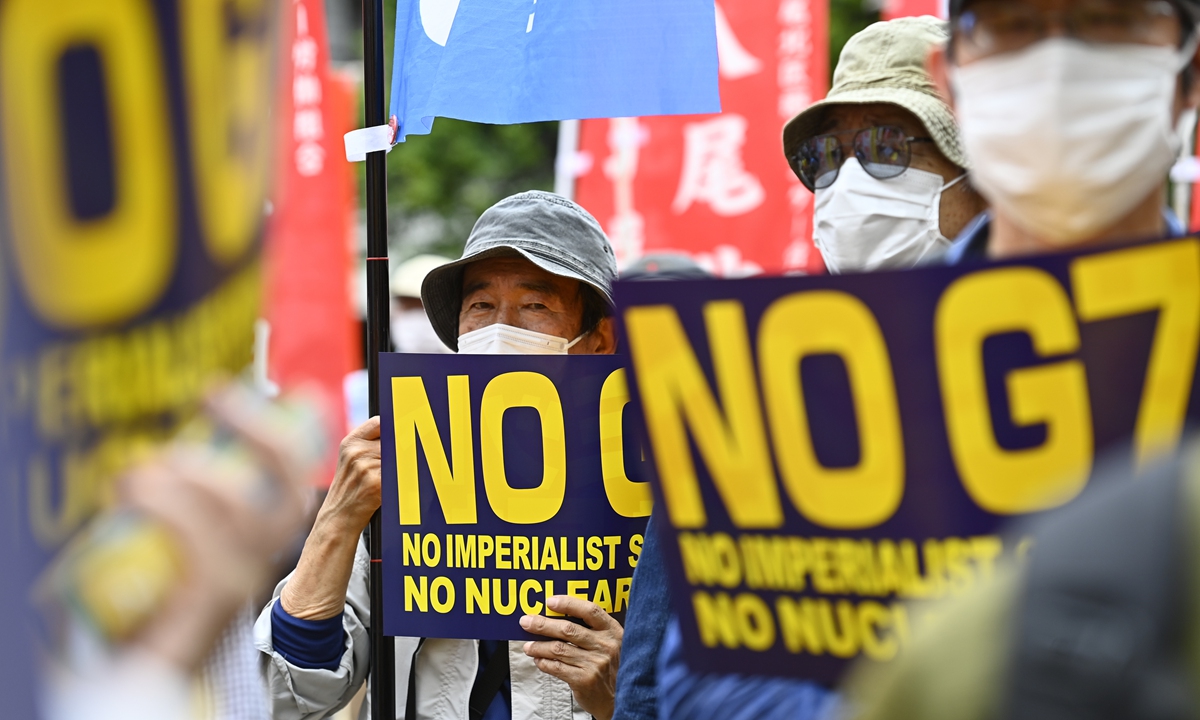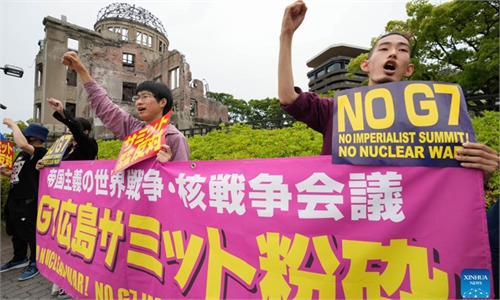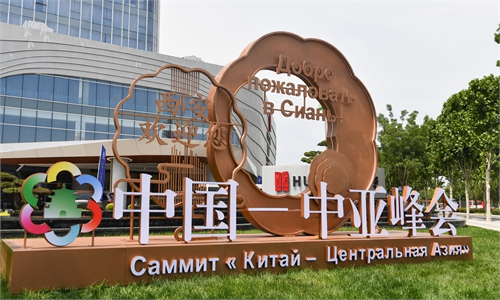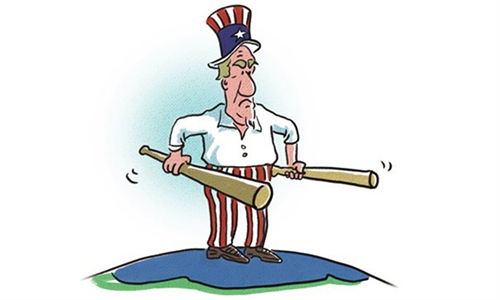China strikes back at 'economic coercion' rhetoric from divided, confrontational G7 summit

People demonstrate on May 19, 2023 in Hiroshima city, Japan, as they protest against the G7 Hiroshima Summit which is held from May 19 to 21.Photo: VCG
China on Friday fiercely pushed back against the Group of Seven (G7)'s plans to "counter China's economic coercion" and push for "de-risking" of their economic relations with China at the summit in Japan, saying the US is the biggest bully and urging the G7 against coercive diplomacy and exclusive small cliques.
The G7 summit kicked off in the Japanese city of Hiroshima on Friday, where hostile plans against China and Russia - neither of which are part of the group - dominate the agenda, even though the bloc is mired in internal division and its members face profound domestic political and economic woes such as the US' debt crisis.
Chinese analysts said that such an agenda shows that the G7 has become a destructive, divisive and confrontational mechanism that goes against the trend of history, while stressing that internal division means the US will not be able to rally other members to adopt its radical anti-China plots.
Confrontational small clique
After much uncertainty over whether US President Joe Biden could attend in person due to the US' debt crisis, the G7 summit officially opened on Friday in the Japanese city where the US dropped an atomic bomb in 1945. Biden joined other G7 leaders in a visit to the Hiroshima Memorial Museum on Friday morning, but did not offer an apology, defying calls from within Japan.
In Hiroshima, many have staged protests against the G7 summit, with some banners and placards reading "Junk G7," "No Build-up to War" and "No to Japan-US Military Alliance," according to Xinhua.
The G7 leaders held talks in the afternoon, but details on the content remained sketchy. However, according to various Western media reports, among the top items on the summit's agenda are more sanctions against Russia over the Ukraine crisis and plans to "counter China's economic coercion."
The G7 leaders are expected to issue a joint statement that includes "a section specific to China", listing issues that include "economic coercion and other behavior," Reuters reported on Friday, citing an unnamed US official. No further details were offered. Meanwhile, the Financial Times reported that the G7 prioritized "de-risking" of their economic relations with China, while ruling out a full decoupling.
Such plans have drawn a harsh response from China. At a regular press briefing on Friday, Wang Wenbin, a spokesperson for the Chinese Foreign Ministry, said that China has never engaged in coercive and bullying practices and is unequivocally against hegemony, unilateralism and coercive diplomacy.
"We urge the G7 to conform to the general trend of an open and inclusive era, and refrain from coercive diplomacy and closed and exclusive 'small circles'," Wang said.
In pointed remarks, he noted that the US invented and owns the exclusive rights to coercive diplomacy. "Today, coercive diplomacy is a standard feature in the US' foreign policy toolbox. In order to realize its own interests, the US deploys containment and suppression in various fields such as politics, economy, military, and culture to engage in coercive diplomacy around the world," Wang said, noting that countries around the world, particularly developing countries, have borne the brunt of the harm.
The Chinese Foreign Ministry on Thursday also reposted a lengthy report in the Xinhua News Agency about the US' coercive diplomacy and the harm it has done, pointing out that it is also ruthless toward its allies. Companies such as Japan's Toshiba, Germany's Siemens, and France's Alstom have all been victims of US coercive diplomacy, Wang said.
"The US and Japan's talk of China's economic coercion is a typical operation by the US," Li Haidong, a professor at the Institute of International Relations at the China Foreign Affairs University, told the Global Times on Friday, noting that the US and Japan are trying to "demonize" China with the "economic coercion" claim.
This is all part of the US plot to lure allies to join in its strategic containment of China's development, but after many countries expressed opposition to the US' push for an economic "decoupling" from China, it is now propagandizing new narratives such as "de-risking," while in essence still pushing for a decoupling, Li noted.
Commenting on the so-called "de-risking" strategy, the Chinese Foreign Ministry spokesperson on Friday also pointed out that none of the biggest risks the world currently faces, including invading smaller countries like Afghanistan and Iraq, breaking international economic principles and trade rules, preaching confrontation and trying to bring the world back into a Cold War, comes from China, but from a small number of countries that stick various labels on China.
Growing divisions
Given the divisions within the G7, the struggle over whether to put "China's economic coercion into the document will continue to the end," Xiang Haoyu, a research fellow at the China Institute of International Studies, told the Global Times on Friday.
"In the end, it is very likely that China will be named or alluded to in some form, but the tone of the relevant wording may be weaker than the US and Japan originally expected," Xiang said, pointing to major divisions within the G7 not just on topics related to China, but also on their own domestic policies, such as the US' so-called anti-inflation act and Chips act.
Highlighting these divisions, at the summit on Friday, European Commission President Ursula von der Leyen took aim at the US, as she called for transparency on industrial subsidies. "We need to provide a clear, predictable business environment to our clean tech industries. The starting point is transparency among the G7 on how we support manufacturing," von der Leyen said, Politico reported.
Divisions also remain within the G7 over the Taiwan question, analysts noted. While the US is relentlessly pushing for confrontation in the Taiwan Straits, some have grown wary of the rising tensions and risks, they said.
"After the summit, statements on issues regarding the Taiwan Straits will not be exactly as the US wishes," said Lü Xiang, research fellow at the Chinese Academy of Social Sciences. However, it is necessary to remind countries that when the US talks about peace and stability in the Taiwan Straits, it actually means interference, and they shouldn't fall into that trap.
Analysts also suggested that G7 countries may even have differences on the Ukraine crisis, as they have coordinated sanctions against Russia before and during the summit.
"On the surface, they will have some similar appeals, but the interest demands behind them must be different. Whether it is from the perspective of profit or loss, their feelings are different," Lü told the Global Times on Friday.
At the summit, G7 leaders agreed to toughen sanctions against Russia and pledged financial support for Ukraine, as Ukrainian President Volodymyr Zelensky prepared to join the meeting, Reuters reported.
Li said that while Zelensky's reported attendance is likely to gain more support from the G7, for some G7 members, it is also about isolating Russia in an all-round manner at every international occasion.
"The G7 itself has become a mechanism for sabotage, division, and confrontation in the process of global economic integration. This is a mechanism that goes against the trend of history," Li said.





